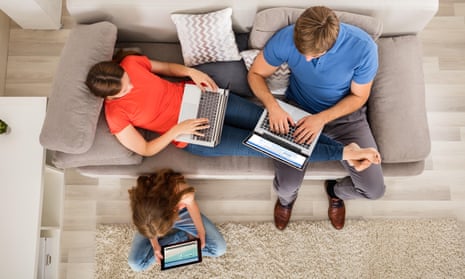The average Briton now spends a quarter of their waking day online, according to new research that shows how internet usage has exploded during the coronavirus pandemic.
Ofcom’s annual Online Nation report reveals that at the height of lockdown the average UK adult was spending a daily average of four hours and two minutes online – up from three-and-a-half hours in September last year.
This is substantially more time than people spend either watching television or listening to the radio, backing up other indicators that the pandemic has acted as a catalyst to speed up existing trends away from traditional media.
Video calling has now become a normal activity for Britons as a result of the lockdown, with the number of people using such services doubling to 70% of the population as a result of the pandemic. The Ofcom research suggests that Zoom, which was little-known before the coronavirus outbreak, has now been used by 13 million British people as workplaces and family groups hold events on the service.
Yih-Choung Teh, Ofcom’s director of strategy and research, said: “Lockdown may leave a lasting digital legacy. Coronavirus has radically changed the way we live, work and communicate online, with millions of people using online video services for the first time.”
The continued growth in popularity of YouTube is also clear, with a third of Britons now spending more time watching online video than traditional television. Most people now experience the internet – and therefore their world of news and entertainment – through their smartphones rather than through laptop or desktop computers.
However, the figures also show one in eight of the population still do not go online at all. This figure has remained stubbornly high for many years and suggests the UK is at risk of having of a class of digital left-behinds.
Only half of people over 75 regularly use the internet, while poorer households are also less likely to have internet connections, with most of the holdouts saying they simply don’t see the point of going online. As a result, Ofcom found these groups are often missing out on the transition to online banking as high-street branches close and they also cannot easily access government services such as passport renewal.
The lack of access to the internet in some more disadvantaged households has also caused issues for education during the pandemic, as poorer pupils may be unable to use online lessons or other educational resources.
